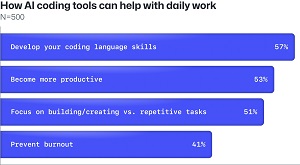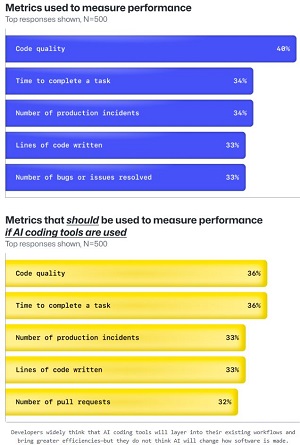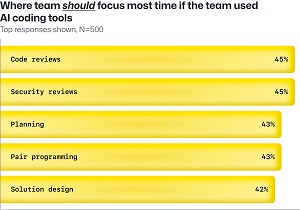News
AI Already Saturates Software Development to 'Staggering' Degree, GitHub Survey Shows
I, probably like you, use AI tools all the time in my job and at home. So do 92 percent of U.S.-based developers, according to a new GitHub survey that confirms what developers already knew, or surely suspected.
Until any potential job-replacement, existential-threat scenario is realized, AI tools are rather becoming a dev's best friend, indicates GitHub's "Survey reveals AI's impact on the developer experience" post published June 13.
"Developers are already using AI coding tools at work," said Microsoft-owned GitHub. "A staggering 92 percent of U.S.-based developers working in large companies report using an AI coding tool either at work or in their personal time." The company also said, "Curiously, only 6 percent of developers in our survey say they solely use these tools outside of work." What's more, some 70 percent of respondents said they saw significant benefits to using these tools.
That 70-percent segment anticipated AI coding tool work benefits and advantages such as better code quality, faster completion times and better incident resolution.
Other benefits are listed in replies to the question of how AI coding tools can help with daily work, where the top three responses fell within the 51-57 percent range:
 [Click on image for larger view.] How AI Coding Tools Can Help with Daily Work (source: GitHub).
[Click on image for larger view.] How AI Coding Tools Can Help with Daily Work (source: GitHub).
The report also investigated developer performance measurement, finding that metrics used to measure performance aligned closely with with metrics that should be used measure performance if AI coding tools are used:
 [Click on image for larger view.] Performance Metrics (source: GitHub).
[Click on image for larger view.] Performance Metrics (source: GitHub).
Other AI-related data points and GitHub observations in the report include:
- Developers are already using generative AI coding tools to automate parts of their workflow, which frees up time for more collaborative projects like security reviews, planning, and pair programming.
 [Click on image for larger view.] Team Focus with AI Tools (source: GitHub).
[Click on image for larger view.] Team Focus with AI Tools (source: GitHub).
- More than 4 out of 5 developers expect AI coding tools will make their team more collaborative.
- 57 percent of developers believe AI coding tools help them improve their coding language skills -- which is the top benefit they see.
- 41 percent of developers believe that AI coding tools can help with preventing burnout.
- The use of automation and AI has been a part of the developer workflow for a considerable amount of time, with developers already utilizing a range of automated and AI-powered tools, such as machine learning-based security checks and CI/CD pipelines.
GitHub's report also listed three takeaways engineering and business leaders should consider to improve the developer experience:
- Help your developers enter a flow state with tools, processes, and practices that help them be productive, drive impact, and do creative and meaningful work.
- Empower collaboration by breaking down organizational silos and providing developers with the opportunity to communicate efficiently.
- Make room for upskilling within developer workflows through key investments in AI to help your organization experiment and innovate for the future.
While AI pervaded the report, multiple sections addressed several other areas of the developer experience.
"Amid the rapid advancements in generative AI, we wanted to get a better understanding from developers about how new tools -- and current workflows -- are impacting the overall developer experience," GitHub said. "As a starting point, we focused on some of the biggest components of the developer experience: developer productivity, team collaboration, AI, and how developers think they can best drive impact in enterprise environments."
As far as report methodology, Wakefield Research conducted an online survey on behalf of GitHub March 14-29, 2023, among 500 non-student, U.S.-based developers who are not managers and work at companies with more than 1,000 employees.
About the Author
David Ramel is an editor and writer at Converge 360.